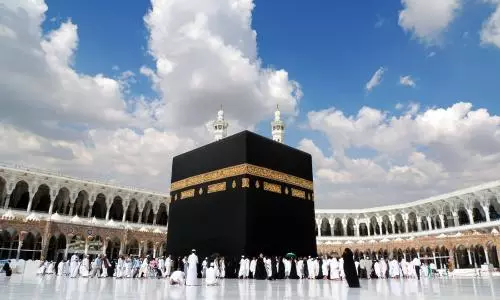
A Haj Policy with nothing new
text_fieldsA preliminary analysis of the new Haj policy put forth by Union Minister for Minority Affairs would make it clear that it does not provide a permanent solution to the apprehensions and grievances of the Haj pilgrims and those working in areas related to the process of Haj.
Although the Haj Committee of India and the State Haj Committees are statutory bodies, it has been many a time pointed out that the crux of the issue is not allowing them a crucial role in the matter of pilgrimage. The limitations start from the fact that the Haj Committees which are formed democratically do not have a crucial role in forming the basic policies and guidelines related to the process of Haj. Pitifully, they are mostly left to stand as silent spectators in forming the framework and in the implementation of Haj services and mechanisms. It is unfortunate that the new Haj policy prepared after accepting some recommendations and rejecting others of the review committee headed by former diplomat Afzal Amanullah, does not offer solutions to the problems raised by states like Kerala. The constant clamour for a special consideration to be accorded to Kerala, which has the highest number of Haj applicants, seems to have fallen on deaf ears.
At the same time, reducing the pilgrim quota for the Hajj Committee from 75 per cent to 70 per cent will undoubtedly cheer the private Haj companies that reap exorbitant profits. Given that the government has little control over the private Haj service companies, even the Minister might not have an answer for as to why their quota has been raised to 30 per cent. The Centre ‘took care’ of the private sector that always approaches even the Supreme Court to enhance their quota on the pretext of a ‘deal’ made with Saudi Arabia. The truth is that there is no such deal. Since many other countries ferry all their pilgrims using the government machinery, they are able to make arrangements for performing Haj at a low expense. The Committee would have been able to present productive suggestions had it conducted a preliminary study about the effective reform in this regard implemented by Indonesia that sends the maximum number of Haj applicants (almost 2, 11, 000). However, it could be understood that Afzal Amanullah Khan, who is also a former Haj Consul, was concerned only about the interests of the Centre; he did not even contemplate on the required reforms in the process of Haj pilgrimage.
The Haj Committee shoud have been given at least the right to decide who all should perform haj. The decision to retain the priority given to those above 70 years of age is a wise one. However, the withdrawal of priority to the fifth time applicants is quite unfair. Most countries adopt a more logical consideration on this score. Given that it is not easy to win the draw for the limited seats, it is beyond comprehension as to what the government will gain by withdrawing the 'reservation' followed so far. In a related matter, instead of fixing the quota proportionate to the population of each state, the government should have fixed quota in proportion to the number of applicants in each state. For applicants from states with higher Muslim-population like UP, Bihar and Assam are far outnumbered by the relatively small state of Kerala. Due to the same fact, a sizeable number of haj aspirants from Kerala can see their haj dream into fruition through the priority accorded to the fifth time applicant. Once the new policy is put into effect, such an opportunity will cease. In other words, none of the recommendations submitted by Kerala before the Central Haj Committee has been accepted.
The decision to maintain the 21 existing embarkation points is welcome. But the suggestion that pilgrims can choose embarkation points with cheaper air tickets as they wish, is not feasible. And if Nedumbraasery is fixed as the embarkation point for Kerala’s pilgrims, that decision is sure to invite outrage, since 90 per cent of Kerala’s pilgrims are from Malabar. The move to ditch Karippur, and to fatten the partly private-owned Nedumbrassery in effect would amount to clear breach of promise of Kerala's Chief Minister of Kerala and the minister of Haj who had on several occasions repeated that next year’s haj pilgrims will be embarking from Karippur. Therefore, now if the state government has not been able to persuade the Central Government to take such a decision, that may speak for either the lack of will of the state government or the influence exerted by the Nedumbrassery lobby.
Given the haj experience till now, what is needed is a haj policy with emphasis on minimizing the financial burden of the pilgrim and on reducing his hardships. In summary, the clamour of such a policy will continue to be raised in future.











